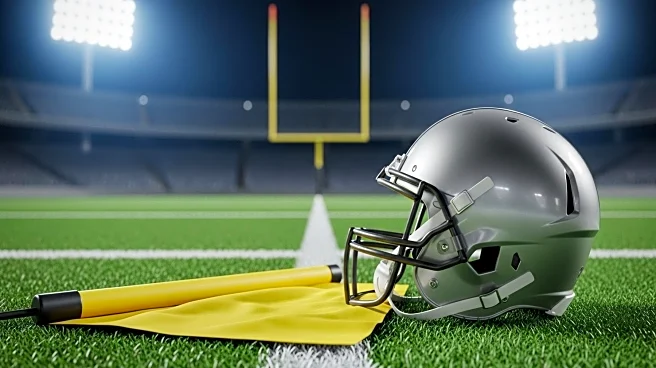What's Happening?
Shilo Sanders, a safety who recently played for his father Deion Sanders at Colorado, has been fined $4,669 for punching a Buffalo Bills player during the Tampa Bay Buccaneers' preseason finale. The incident led to Sanders' ejection from the game. Following the ejection, Sanders was released by the Buccaneers and has not been signed by another team. In an Instagram video, Sanders expressed gratitude for his time with the Buccaneers and indicated that he is open to pursuing opportunities outside of football, such as music, modeling, or acting. Deion Sanders, his father and coach at Colorado, stated that Shilo is prepared for future opportunities, whether in football or other fields.
Why It's Important?
The fine and subsequent release of Shilo Sanders highlight the NFL's strict policies on player conduct during games. This incident underscores the challenges athletes face in maintaining professional behavior and the consequences of failing to do so. For Sanders, the situation presents a pivotal moment in his career, potentially shifting his focus from professional football to other ventures. The broader impact on the NFL includes reinforcing the league's commitment to sportsmanship and discipline, which can influence team dynamics and player reputations. Sanders' situation also reflects the pressures young athletes face in balancing career aspirations with personal conduct.
What's Next?
Shilo Sanders is currently a free agent, and his future in the NFL remains uncertain. His father, Deion Sanders, has expressed confidence in Shilo's ability to succeed in various fields, suggesting that plans are in place for his next steps if he does not secure another NFL opportunity. The situation may lead to Sanders exploring alternative career paths, leveraging his talents in music, modeling, or acting. Meanwhile, NFL teams may consider the implications of signing a player with recent conduct issues, weighing the potential benefits against the risks.
Beyond the Headlines
The incident involving Shilo Sanders raises questions about the pressures young athletes face in maintaining professional conduct and the support systems available to them. It also highlights the role of family influence in shaping career decisions, as seen in Deion Sanders' involvement in his son's future plans. The situation may prompt discussions on the importance of mentorship and guidance for athletes transitioning between career phases, whether within sports or in other industries.










